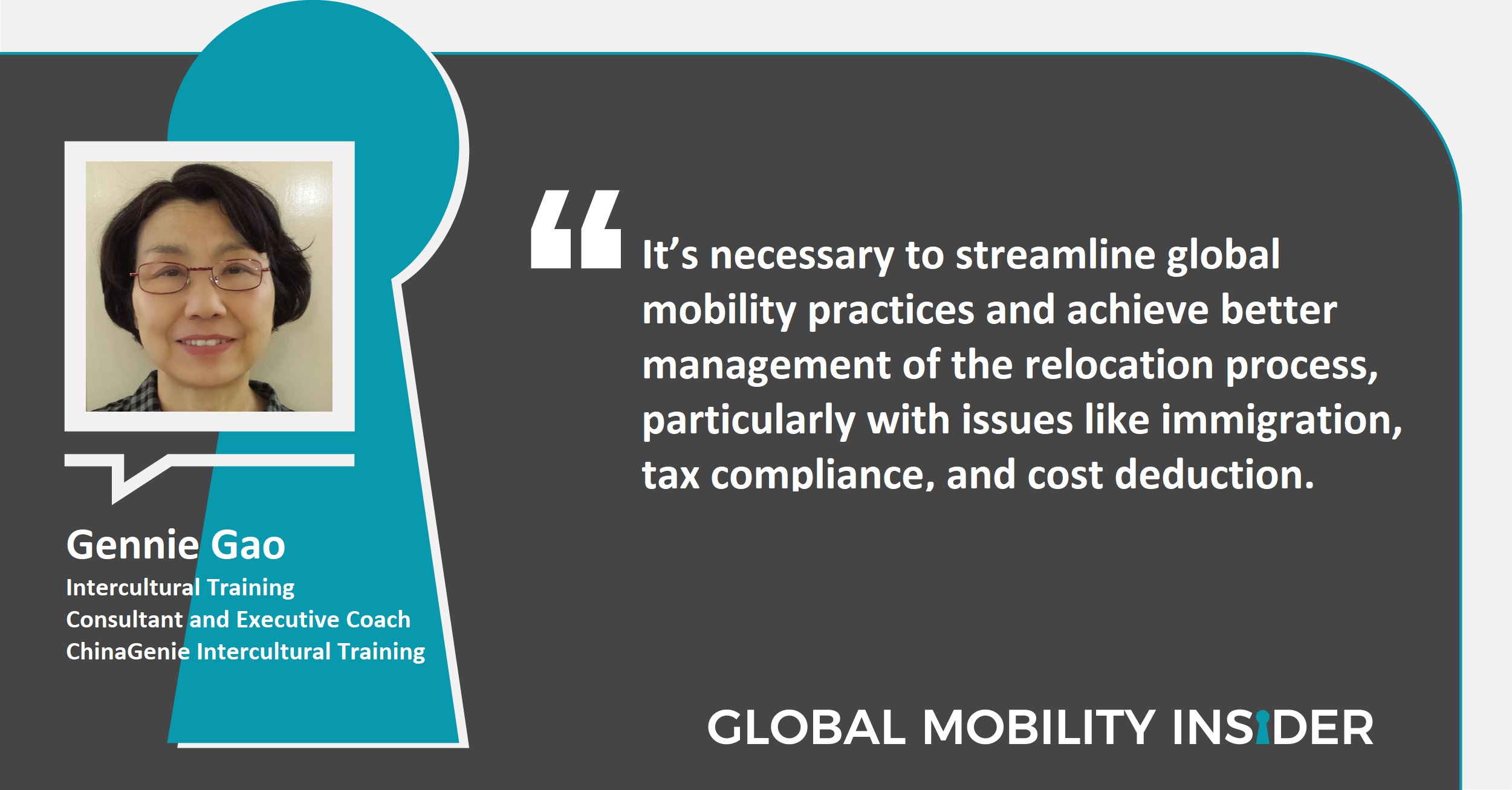Gennie Gao - Intercultural Training Consultant and Executive Coach - ChinaGenie Intercultural Training
Name: Gennie Gao
Position: Intercultural Training Consultant and Executive Coach
Company: ChinaGenie Intercultural Training

Professional Background
ChinaGenie Intercultural Training, Intercultural Training Consultant and Executive Coach (United Kingdom) 1995 – Present
Crown Relocations, Service Partner (United Kingdom): 2007 – Present
Cartus, Home Search Consultant (United Kingdom): 2018
Lincoln College International KSA, Vocational Education Lecturer (Saudi Arabia): 2015 - 2017
Morley College, Chinese Lecturer (United Kingdom): 2002 - 2009,
BBC Worldwide, Chinese Journalist and Producer (United Kingdom): 1998 – 1999
SBS Australia, Chinese Producer and Broadcaster (Australia): 1994 – 1998
HCCM JV, Executive Assistant (China): 1989 – 1991
China Packaging Corporation, Beijing, International Business Relations Officer (China): 1985 – 1987
Shandong Packaging Company, Jinnan, Marketing and Information Officer (China): 1983 – 1985
Career Insider
Q: Has your own experience as an expat contributed to your work with Crown Relocations?
A: Absolutely. I have lived and worked in: Sydney, Australia; Khobar, Saudi Arabia; and London, UK across three continents since 1991. I can say now that I am a seasoned international employee. However, at the start of my expatriate journey, I also inevitably went through periods of cultural shock, excitement, disappointment and cultural readjustment. And all these personal experiences have enriched my training programmes for international assignees and other British and Chinese corporate clients as a whole. In many training situations I actually can draw on my own relocation experience and provide a case in point to make the training and coaching sessions more effective and engaging.
Click & Like on LinkedIn
Q: What are you proud of achieving in your career and what's next?
A: As you can see, I have ventured into a few different job roles in a span of 35 years. It has been an incredible journey from China to Australia, to the UK and to Saudi Arabia. I was a civil servant with the Chinese government; I had my broadcasting career in Australia upon receiving my MA in international Communication from McQuarie University; I thrived with an education and training career in London and I had an adventurous teaching experience in Saudi Arabia. I never thought I would be able to do many different things in my life but I did. I really have enjoyed exploring human potential along the way and am proud of what I have done so far.
I intend to stay in the training business for the next a few years. In the meantime, I would like to start some research about leadership change in China’s younger generations of CEOs and company directors, as China is stepping into the centre of international business arena. Issues like; what are the differences in leadership styles between the older and younger CEOs? How China’s elderly employees take instructions from their young bosses? How the market economy has shaped the leadership styles of younger executives in China? These will be my research areas. I hope these research results will also help international executives to understand China better and make their business strategies for China more effective and rewarding.
Q: What drew you to work as an intercultural training consultant?
A: Having worked in the media and education sector, I was always keen on presenting my work to an audience and giving advice to people. I had an opportunity to attend a training workshop for a Business Cultural Training Certificate in International House London back to 2004 during my employment with Morley College. It was a life changing experience. I went on setting up my own training consultancy in London and started working for Crown as a service provider and an intercultural training consultant. So far, I have worked with many MNCs in the UK and Europe.
Industry Insider
Q: What do you think is the primary thing hindering the industry's progress?
A: I think there are two issues that matter to the relocation industry. There is a high failure rate in expatriate relocation. According to a research as many as 40% of international relocation assignments fail or lead to repatriations. Problems like cultural difficulties, family issues, spouse career, schooling and lack of preparation and adjustment strategies are the primary causes behind failed international relocation.
Secondly, relocation cost management is always a challenging issue to most companies that move employees internationally.
Q: What is the most important strategic tip you can give to companies moving staff across cultures?
A: My suggestion is that the HR departments of all companies involved in global mobility projects should put soft skills training, such as host country cultural training for assignees as a priority. In my experience, those expatriates who came to attend intercultural training programmes within one week of their arrival were better prepared for cultural adjustment and workplace change. As a result, they are cool-headed under pressure and quickly become productive in their new environment. At other times if the relocation companies don’t sell the cultural training programme well to their moving staff, some assignees were not aware of the training programme. Then they would enrol in the training later. More often than not, by the time they came to me most of them already had problems with their new bosses or new teams. They also encountered difficulties for social and cultural adaptations outside work. So, I would say a post-arrival cultural training programme is a vital step for successful talent strategy. With training or without training makes the difference between success and failure.
Visionary Insider
Q: How well do you think issues surrounding diversity and inclusion are handled in the global mobility sector? What could they do better?
A: I think most companies are not reaping the benefits of diversity and inclusion even though it is a corporate policy. As a matter of fact, the global mobility sector is where a diverse workforce can play an increasingly important role; where diversity and inclusion can drive creativity, innovation and competition across various cultures and geographies. However, despite global mobility being on the rise, women and minority workers are still underrepresented in some industries.
Companies moving employees around the world still need to have ethnically and gender-diverse leaderships in order to implement diversity and inclusion policies. Leaders must have awareness of these matters and make them part of the organisational goal.
Q: How can global mobility practices get better in the next 5 years?
A: In order to improve the performance of global mobility sector in the next five years, it’s necessary to streamline global mobility practices and achieve better management of the relocation process, particularly with issues like immigration, tax compliance, and cost deduction. Relocation companies need to focus on relocation success at the beginning of the strategic planning stage. Map out all the services needed and bring the third-party service partners from accommodation acquisition to household shipping to post-arrival training together under one roof, with a strong emphasis on coordination and communication.
Q: What more can be done to improve current global mobility practices to benefit talents on the move?
A: Nowadays talents are more mobile than ever and noticeably the ages of the international assignees are getting younger and younger. Among them, the millennials are setting new trends for the global mobility industry, such as DIY moves and low-cost moves, which are on the rise. Companies with talent mobility will need to have corresponding policies to support and accommodate employee-initiated moves and unregulated online travel options like Airbnb and Uber.
Secondly, have a complete repatriation policy to retain returning staff. With many young professionals seeking new experiences and moving from one company to another these days, companies will need to make international assignments part of career development; offer a promotion or a new role upon repatriation.
Finally, global mobility service providers need to be more engaged with their moving assignees and provide consistent and individual services. It is important to establish an effective communication channel between all parties of the mobility services.


Leave a Comment
* Fields marked with this asterisk are mandatory.